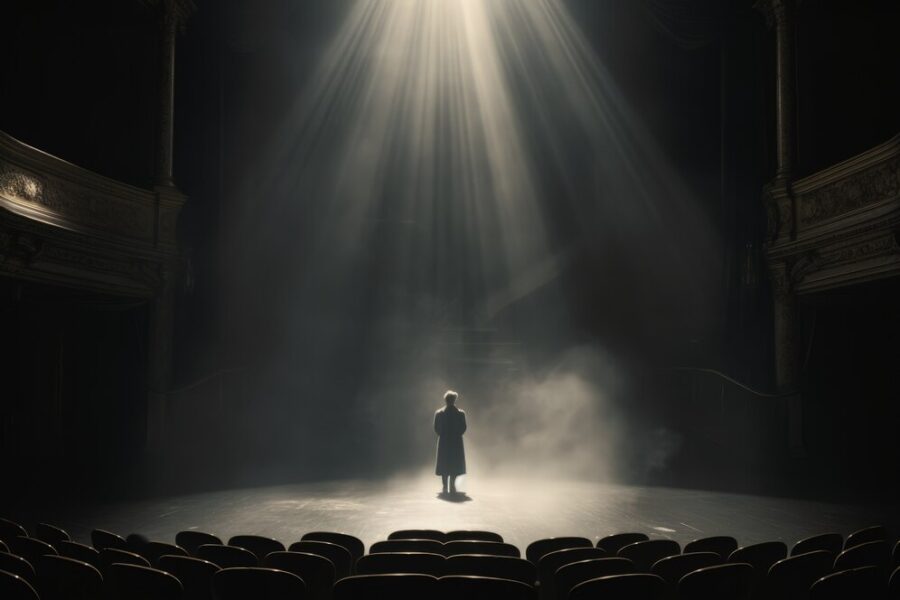
About two weeks ago, we saw a play in Exeter’s Barnfield Theatre that’s left us with a whole lot to think about. The Luminous draws parallels between important historical events and more familiar and contemporary issues. The show will leave you wondering how far women’s issues have come and how much further there’s left for us to go.
The play opens in direct conversation with the audience; a condescending nurse discusses an incidence of rape with the absent victim. She was on her way home from a protest when it happened. In the background, the spirit of a Victorian woman in the form of an unsettling gowned puppet lurks as a kind of foreshadowing. Although not immediately obvious, this scene introduces the play’s main themes: rebellion, women’s bodies and abuse.
… the play’s main themes: rebellion, women’s bodies and abuse.
We meet the three main characters in the following scene; nurses from a nearby hospital have set up a book club to relax, talk about life and drink wine. The book they choose to discuss this week is about Victorian women who worked in match factories by day and pursued dreams of making it on the ‘big stage’ in a theatre company by night.
Inspired by the book, the women delve deeper and deeper into their own histories. Parallels are constantly drawn between the novel and the women’s present lives: victims of abuse in their wards feel disturbingly similar to those undergoing autopsies in the novel. The looming presence of Jack the Ripper reminds them of growing up fearing the Yorkshire Ripper in the eighties. As mothers and nurses, conversations about abortion, wanting or not wanting children, and childbirth and its complications also strike dangerously close to home when they learn about the brutal experiences of Victorian women. Micro-aggressions against women in the book are not dissimilar to those experienced by women over one hundred years later. Meanwhile, we’re also aware that the fourth member of the book club, Annie, is yet to arrive at the house and we grow increasingly anxious about what might have happened to her.
The setup is simple but effective. The main stage has a few benches that serve as a sofa, a stage and an operating table depending on the scene. In the background, an old projector is used interactively to illustrate the chapters of the book that they’re acting out. With the use of simple props, the characters switch effortlessly between their roles as nurses and Victorian women.
A few days after the performance, once our first impressions had developed into more concrete ideas and questions, we got to talk to Rebecca Loukes, one of the play’s creators and actresses. Loukes is a part-time lecturer at the University of Exeter and helps run the Redcape Theatre.
“I would describe the show as a powerful story of friendship, rebellion and a book club,” says Loukes. She explained that the play was centred around three protests throughout history:
The Matchgirls’ strike from the nineteenth century in which women protested dangerous working conditions, unfair pay and the phosphor from the matches that was slowly killing them.
The Greenham Commons peace camps from the eighties, when women marched from Wales to Greenham in protest of nuclear weapons being stored at RAF Greenham Common.
And the ever-topical, ever-resurfacing Reclaim the Night protests in relation to Jack the Ripper, the Yorkshire Ripper and the persistent fears women face when walking alone at night.
I would describe the show as a powerful story of friendship, rebellion and a book club.
Rebecca Loukes
In the process of writing the play, they researched books concerning the Matchgirls and their lives for inspiration and interviewed women from the Greenham Commons peace protests for personal stories.
She goes on to explain that the play’s themes connect around the idea of the female body throughout history: “women’s control and ownership over their bodies, women using their bodies as tools for resistance by putting them on the line in protest and the female body in relation to abuse.”
As described by Rebecca Loukes, the play represents “a cat’s cradle of different threads woven together.”
The performance certainly hit the mark in terms of this complexity; the multiplicity of storylines and themes was intriguing. But whilst we came away having understood everything in singularity, we were unsure of what exactly tied it all together, both seemingly unable to pin down the play’s main message. Were we supposed to feel empowered? Hopeful? Optimistic about the future? Or was the message that nothing has changed, and nothing will?
Rebecca explained that the play was designed that way: “Audiences take away different things and are drawn to different themes. The play can prompt you to think about your own experiences.”
The play can prompt you to think about your own experiences.
Rebecca Loukes
The Luminous quite literally sought to shed light on so many different themes that some plotlines became lost in the shadow of others. In our opinion, the show could have benefited from a more streamlined narrative. Having the main characters be nurses, for example, brought in the inevitable conversation about the NHS and its current shortcomings. Although significant for contemporary audiences, we felt that this detail overcomplicated an already complex plot line and failed to reinforce any of the central themes.
Having had the privilege to speak to one of the creators herself, we have been able to tie up any loose ends in our understanding. However, had we not been able to ask questions, some of the story’s details and their significance might have been lost on us in the sheer volume of things to think about.
Overall, we thought the performance was incredibly thought-provoking, well-acted and drew on significant and topical themes. It was emotionally captivating, with some parts rendering a sense of empowerment, and others deeply saddening. However, a more concise plot might have made these feelings more profound and left the audience with an impactful sense of finality.


